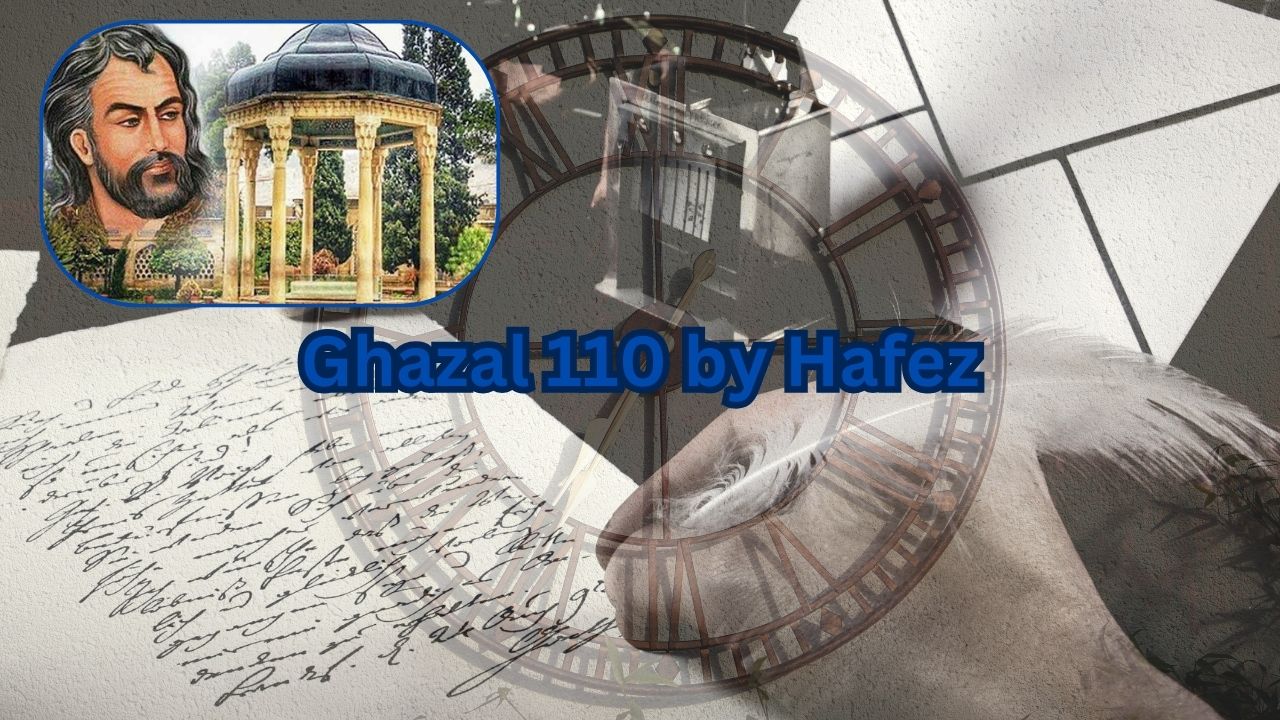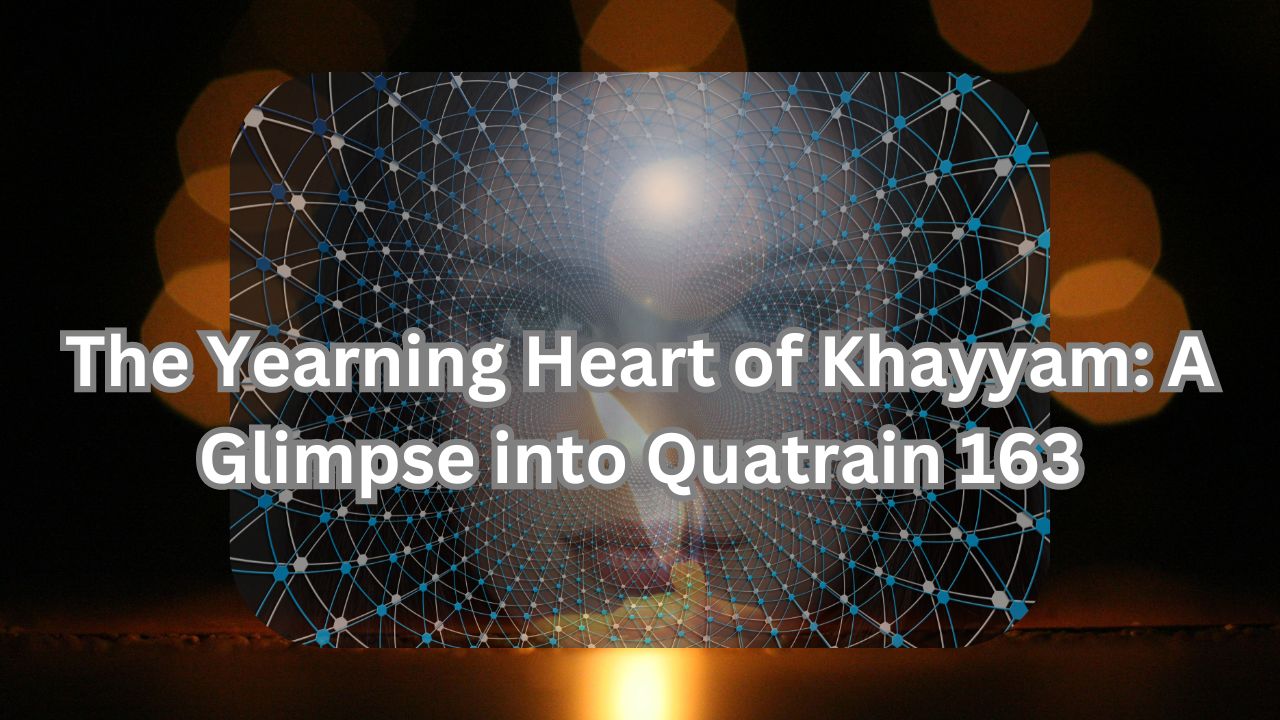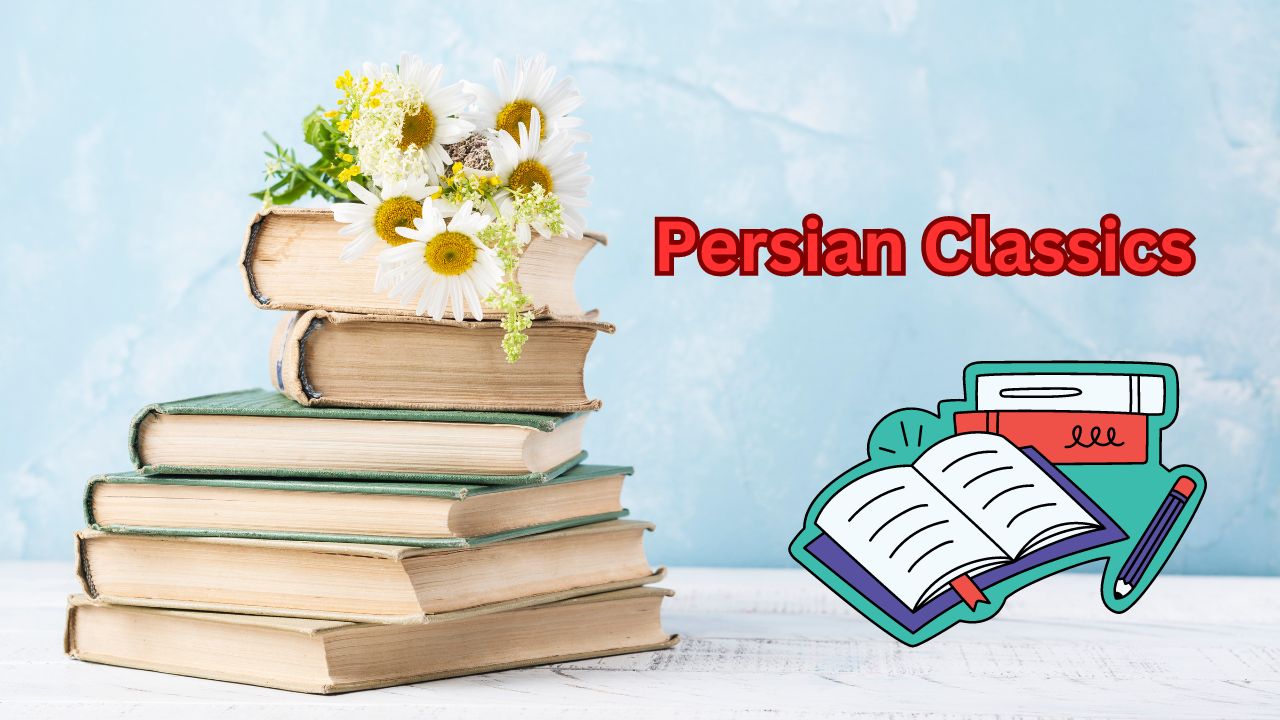Hafez, the renowned Persian poet, often goes into the complexities of love and human experience. In Ghazal 110, he presents a poignant exploration of age and desire. With characteristic lyrical beauty, Hafez reveals the unexpected turn of events when the passion of youth ignites within him during his twilight years. This ghazal is a testament to the enduring power of love, transcending the boundaries of time and societal expectations.
پیرانه سَرَم عشقِ جوانی به سر افتاد
وان راز که در دل بِنَهفتم به درافتاد
In my old age, the love of youth has befallen me,
And that secret I had hidden in my heart has been revealed.
"The phrase 'pirane sar' (grey-haired) suggests that this ghazal was composed by Hafez in his old age. Our love-struck poet, in his twilight years, is entangled in a youthful love affair, as is often the case. It seems that Hafez was always in love, and no period of his precious life passed without love, be it earthly or divine. In this particular ghazal, considering the themes and expressions of the verses, the beloved is earthly, and Hafez has fallen in love in the manner of young lovers!
'Javan' can be interpreted as both a handsome young man and the period of youth. Both meanings seem to be intended by the poet.
In this ghazal, Hafez indicates that in his old age, he had hoped to, at least, abandon the behavior of a worldly-wise, wine-drinking reveler and embrace piety and purity. However, it appears that a lovable young sweetheart has arrived and captured his heart, ultimately revealing his hidden secret: his infatuation in old age.
Meaning of the couplet: Although I am in old age, I have fallen for a love that is not befitting of my age! A youthful love or the love of a youth has befallen me, and I have been unable to conceal the secret of my love, and my hidden secret has been revealed.
They say that love and a cough cannot be hidden!"
***
از راهِ نظر مرغِ دلم گشت هواگیر
ای دیده نگه کن که به دامِ که درافتاد
My heart, like a bird, has become entangled in the net of a glance,
O eye, look and see in what trap it has fallen.
Breakdown of the Persian phrases and their meanings:
-
از راهِ نظر: "By way of sight," or "through looking."
-
هواگیر: This word has multiple meanings, but in this context, it can be translated as "captured in the air" or "caught in a trap." It's often used metaphorically to describe someone who has fallen in love or is infatuated.
Translation of the couplet:
-
Literal translation: "Through observation (as the sight-seers would say), the bird of my heart has been captured. O eye of sight, see my condition, for my heart has fallen into whose trap?"
-
Poetic translation: "My heart, like a bird, has been ensnared by what I've seen. O my eyes, behold this strange state of affairs! For into whose net has my heart been drawn?"
Interpretation of the overall meaning:
The poet is expressing a sense of wonder and astonishment at his own feelings. He is saying that his heart has been captured by someone he has seen, and he is asking his own eyes to witness the strange and unexpected nature of this love.
Context and deeper meaning:
The poet is using vivid imagery to describe the experience of falling in love. He compares his heart to a bird that has been caught in a trap, suggesting a sense of helplessness and entrapment. The phrase "از راهِ نظر" indicates that the love has been sparked by a visual encounter.
The poet's use of the word "هواگیر" adds a layer of complexity to the meaning. It suggests that the beloved is somehow "above" the poet, perhaps in terms of social status, beauty, or spiritual attainment. This could explain why the poet is so surprised and captivated by their love.
***
دردا که از آن آهوی مُشکینِ سیه چشم
چون نافه بسی خونِ دلم در جگر افتاد
Alas, from that black-eyed musk deer
Much of my heart's blood has fallen into my liver like a musk pod.
Breakdown of the Persian phrases and their meanings:
-
آهوی مُشکین: "Musk deer." This is a metaphor for a beloved, specifically one who is both beautiful and captivating, similar to a musk deer known for its fragrant musk.
-
خُتن: A historical region located in present-day Xinjiang, China. The musk deer of Khotan were particularly famous for their high-quality musk.
-
نافه: A small sac in the groin of the musk deer that produces a strong-smelling substance called musk, used in perfumes. In this context, it's used metaphorically to represent the poet's heart, filled with the passion of love.
Translation of the couplet:
-
Literal translation: "Alas and alack! Woe to that sweetheart who is beautiful like the musk deer of Khotan and has caused blood to spill in my heart with their coquetry. Thanks to their belovedness, I too have fragrant musk sacs in my heart. For the blood of my heart, being related to love, has the scent of passion and is fragrant."
-
Poetic translation: "Alas, how cruel that my beloved, as beautiful as the musk deer of Khotan, has stirred such passion within me. Their coquetry has wounded my heart, yet it is their very charm that has filled my heart with the sweetness of love. Like the musk deer, my heart now holds a fragrant secret, a testament to the passion that consumes me."
Interpretation of the overall meaning:
The poet is expressing the intensity of his love for his beloved, comparing them to a musk deer. The image of the musk deer is used to convey the beloved's beauty, allure, and the powerful effect they have on the poet's heart.
The metaphor of the "nafe" (musk sac) is used to represent the poet's heart, filled with the passion and longing inspired by his love. The idea is that the pain of love has produced a sweet and fragrant substance within him, similar to the musk produced by the deer.
In essence, the poet is describing a love so intense that it has transformed him, leaving a lasting and fragrant impression on his heart.
Key themes and poetic devices:
-
Metaphor: The comparison of the beloved to a musk deer and the heart to a musk sac is a striking and evocative metaphor.
-
Imagery: The images of blood, fragrance, and the exotic location of Khotan create a vivid and sensual picture.
-
Emotion: The poet conveys a deep sense of passion, longing, and pain.
The overall effect of the poem is one of intense romantic longing, expressed through rich imagery and metaphor.
***
از رهگذرِ خاکِ سرِ کویِ شما بود
هر نافه که در دستِ نسیمِ سحر افتاد
Every musk pod that fell into the hands of the morning breeze
Was from passing by the dust of your threshold.
Breakdown of the Persian phrases and their meanings:
-
رهگذر: Literally means "passerby" or "traveler," but here it's used to mean a "pathway" or "road."
-
نافه: As mentioned before, this refers to a small sac in the musk deer that produces a strong-smelling substance. Here, it's used metaphorically to represent a source of fragrance.
Translation of the couplet:
-
Literal translation: "O beloved, if the breeze scatters all these sweet fragrances, it borrows them all from the pathway on which you place your blessed foot. The dust of your pathway is the original source of those very fragrances that the breeze bestows upon the garden."
-
Poetic translation: "My love, the sweet scents carried by the breeze all originate from the path you tread. The very ground you walk upon is the source of these fragrant perfumes that fill the gardens and fields."
Interpretation of the overall meaning:
The poet is suggesting that the beloved's presence is so fragrant and alluring that it permeates everything around them. The pathway they walk on becomes a source of sweet-smelling perfumes that are carried by the wind and spread throughout the world.
In essence, the poet is saying that the beloved is the ultimate source of all beauty and fragrance, and that their mere presence can transform the world around them.
Key themes and poetic devices:
-
Metaphor: The comparison of the beloved to a source of fragrance is a powerful metaphor that highlights their beauty and allure.
-
Imagery: The images of the breeze carrying fragrances and the dust of the pathway create a vivid and sensory experience.
-
Devotion: The poet expresses a deep devotion to the beloved, suggesting that they are almost divine in their ability to transform the world.
The overall effect of the poem is one of profound admiration and love, expressed through elegant and evocative language.
***
مژگانِ تو تا تیغِ جهانگیر برآورد
بس کشتهٔ دل زنده که بر یکدِگر افتاد
When your eyelashes were raised like Jahangir's sword,
Many a living heart fell upon each other, slain.
Breakdown of the Persian phrases and their meanings:
-
دل زنده: Literally means "living heart," but here it's used to mean someone who is "aware," "conscious," or "knowledgeable," especially in matters of love.
-
تیغ: Sword
-
جهانگیر: Conqueror of the world
-
کشته: Slain, killed
Translation of the couplet:
-
Literal translation: "When your charming eyelashes drew their sword in the battlefield of love and intended to conquer the world, many living hearts (lovers and the wise) were slain by the sword of your eyelashes and fell upon each other like autumn leaves."
-
Poetic translation: "Your captivating gaze, like a sword, has conquered the hearts of many. When you set out to win over the world with your enchanting eyes, countless lovers, wise and knowing, fell victim to your beauty, their hearts scattered like autumn leaves."
Interpretation of the overall meaning:
The poet is addressing a powerful and captivating individual, likely a king, whose beauty and charm have had a devastating effect on their admirers. The image of the eyelashes as a "sword" and the lovers as "slain" emphasizes the overwhelming power of the beloved's beauty.
In essence, the poet is describing how the beloved's captivating gaze has conquered the hearts of many, leaving them defeated and heartbroken.
Key themes and poetic devices:
-
Metaphor: The comparison of the beloved's eyelashes to a sword and the lovers to soldiers is a striking and evocative metaphor.
-
Imagery: The image of the lovers falling like autumn leaves creates a vivid and poignant picture.
-
Power: The poet emphasizes the immense power and influence of the beloved.
The overall effect of the poem is one of awe and admiration for the beloved, combined with a sense of the devastating impact of their beauty.
Based on the context, it seems likely that the poet is addressing a powerful ruler, perhaps Shah Shujā', whose beauty and charisma have captivated many.
***
بس تجربه کردیم در این دیرِ مکافات
با دُردکشان هر که درافتاد برافتاد
We've experienced much in this world of retribution,
Whoever associated with the afflicted, fell.
Breakdown of the Persian phrases and their meanings:
-
دیر مُکافات: Literally means "delayed reward," but here it's used to refer to the concept of karma or the idea that every action, good or bad, will eventually have consequences.
-
دُردکشان: These are people who were so poor that they could only afford to drink the dregs of wine. In Hafez's poetry, they are often associated with revelers, free spirits, and those who have renounced worldly possessions.
-
رندان و خراباتیان: Revelers who frequent taverns. In Sufi poetry, they are often seen as spiritual seekers who have abandoned the material world.
Translation of the couplet:
-
Literal translation: "We have experienced and witnessed with our own eyes and ears that those who intended to confront the dregs-drinkers or eliminate them were unsuccessful and suffered a severe defeat themselves."
-
Poetic translation: "Time and again, we have seen that those who dared to challenge the free-spirited revelers met with failure. It seems that no one can defeat those who have truly let go of worldly attachments."
Interpretation of the overall meaning:
The poet is saying that those who try to harm or suppress individuals who have renounced worldly possessions and embraced a life of spiritual freedom are destined to fail. The "durdkeshan" are portrayed as being invincible, not because of their physical strength or worldly power, but because of their spiritual purity and detachment.
In essence, the poet is arguing that those who have truly liberated themselves from worldly desires are invulnerable to the attacks of those who are still bound by material attachments.
Key themes and poetic devices:
-
Spiritualism: The poem emphasizes the spiritual strength and resilience of those who have renounced worldly possessions.
-
Irony: The "durdkeshan," despite their poverty, are depicted as being more powerful and resilient than those who have wealth and power.
-
Metaphor: The "durdkeshan" are used as a metaphor for spiritual seekers and those who have achieved inner peace.
The overall effect of the poem is to celebrate the power of the human spirit and to suggest that true strength comes from within, rather than from external sources.
The key message is that those who have freed themselves from worldly attachments are almost invincible, and any attempt to harm or control them is doomed to failure.
***
گر جان بدهد سنگِ سیه، لعل نگردد
با طینتِ اصلی چه کُند، بدگهر افتاد
Even if a black stone gives its life, it won't become a ruby,
What can a base nature do with its original essence?
Breakdown of the Persian phrases and their meanings:
-
گر جان بدهد: Literally means "if he gives his life," but here it implies a willingness to go to any extreme.
-
لَعل: A precious red gemstone, often used as a metaphor for a beloved or something of great value.
-
طینت: Nature, essence, or character.
-
بدگُهر: Literally means "bad gem," but here it's used to refer to someone with a bad nature or character.
Translation of the couplet:
-
Literal translation: "Even if the worthless black stone gives its life, it cannot have the precious properties of gemstones. What can a poor thing do about its original nature? It has been created black and cannot change its nature."
-
Poetic translation: "A lowly black stone, no matter how much it sacrifices, can never become a precious gem. Its nature is fixed, and it cannot change. It is futile to try to transform what is inherently worthless."
Interpretation of the overall meaning:
The poet is drawing a contrast between something of little value (the black stone) and something precious (the gemstone). He is suggesting that a person's inherent nature cannot be changed, no matter how hard they try.
In essence, the poet is saying that a person's character is fixed, and one cannot simply change their nature by making a superficial effort.
Context and deeper meaning:
The poet is likely using this metaphor to make a point about the nature of human beings. He is suggesting that some people are inherently good and others are inherently evil, and that these qualities cannot be easily changed.
The contrast between the black stone and the gemstone can also be seen as a metaphor for the contrast between the hypocrite (the black stone) and the sincere believer (the gemstone). The hypocrite, no matter how hard they try to appear pious, cannot truly possess the qualities of a genuinely spiritual person.
In the context of the previous discussions, the "black stone" could be seen as representing the hypocrites or those who oppose the "durdkeshan" (the revelers or spiritual seekers).
***
حافظ که سرِ زلفِ بتان دست کشش بود
بس طُرفه حریفیست کَش اکنون به سر افتاد
Hafez, whose hand was once away from the locks of beauties,
What a strange opponent he has become now.
Breakdown of the Persian phrases and their meanings:
-
بُتان: Idols or beloved ones, often referring to beautiful women.
-
دست کش اَش بود: Literally means "it was in his hand," but here it implies a sense of familiarity or ease, as if he was accustomed to handling it.
-
طُرفه: Strange, wonderful, or marvelous. In this context, it can also mean a lover or a playful person.
Translation of the couplet:
-
Literal translation: "Truly, a strange opponent it is! He who has always been engaged with the tresses of beautiful women, now in his old age, has encountered a new, delightful, and cunning lover. His task of taming this lover is proving difficult."
-
Poetic translation: "What a remarkable lover I have found in my old age! I, who have always been skilled in the art of love, now face a new challenge. This lover is both delightful and elusive, and I struggle to win their heart."
Interpretation of the overall meaning:
The poet is expressing surprise and admiration for a new love interest who has captured his heart in his old age. This new love is described as being both enchanting and challenging, unlike the more easily won affections of his youth. The poet suggests that he is struggling to understand and conquer the heart of this new love interest.
Alternative interpretations:
-
The poet as the "strange opponent": Some interpretations suggest that the poet himself is the "strange opponent," meaning that it is unusual for someone of his age to be so deeply in love.
-
The beloved as the "strange opponent": The more common interpretation is that the "strange opponent" refers to the beloved, who is described as being both beautiful and elusive.
The most likely interpretation is that the poet is referring to the beloved as the "strange opponent," as this aligns more closely with the overall theme of love and longing in Hafez's poetry.
In essence, the poet is expressing a sense of wonder and admiration for a new love, while also acknowledging the challenges that come with this unexpected passion.
***





